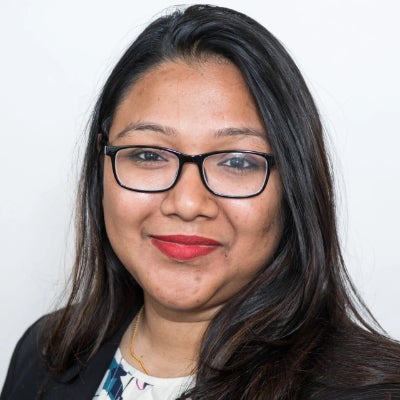Farah Nusrat, who recently received her Ph.D. in Civil and Environmental Engineering at URI, has been selected as a U.S. Geological Survey (USGS) Climate Adaptation Postdoctoral Fellow. The work will take her to Utah State University where she will work with Prof. Michelle Baker in Biological Sciences. Professor Ali Akanda said, “This is a very prestigious fellowship and Farah was hired through a long national level search.” Nusrat will join a Climate Adaptation Postdoctoral Fellows cohort covering nine regions and will explore how climate change is altering aquatic flows in streams and rivers in the south west region across the country and how climate can be integrated into aquatic ecosystem management. Akanda said that Nusrat’s having her Ph.D. in an interdisciplinary field involving water sciences and public health was instrumental in getting the award.
“I will be researching the ways climate is impacting the snowfall, the snowpack, stream flow, and its impact on aquatic life,” Nusrat said. She added that her work will also involve interacting with stakeholders whose decisions will be informed by her research. Nusrat is one of nine postdocs who will work collaboratively as well as individually in contributing to the body of knowledge throughout the area. There will be one postdoc for each region that will relate specific information. “The group will also work together to write a paper or prepare a dataset,” she said. “It could be presented as a paper or an analysis.” Nusrat has already received papers from two professors who did similar work. She’s begun reviewing those to help guide her focus.
Much of the work will involve working from data collected and monitored by computer, but there may be some sampling done in the field. The research area is more related to the climatic variable. “I’m very comfortable in that type of work, because my Ph.D. used this type of analysis,” she said. “Sometimes you want to explore something new, but you still want to connect it to something you already knew. Another thing I’m interested in will be some machine learning or an artificial intelligence aspect of this.”
“If someone had told me 20 years ago that temperatures are going to increase, I wouldn’t necessarily believe it because we did not see that much temperature increase in past compared to present. But now if someone is saying that certain changes will take place in the next 20 or 30 years, I believe them because the research supports a scientist’s claims. That’s how my work and the work of others will impact people’s lives. The average person may not think about the future in the way same as a researcher or scientist, but I have the data and can link the past as well as make predictions.
“I may or may not discover something very prominent, but even a small discovery can be helpful. The impact may not show for ten years, but it will be there.”

